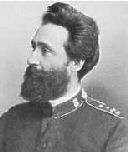Arthur Booth-Clibborn
| Arthur Booth-Clibborn | |
|---|---|
 | |
| Born |
1855 Moate |
| Died | 20 February 1939 (aged 83–84) |
| Nationality | British |
| Known for | Salvation Army |
| Spouse(s) | Kate Booth |
Commissioner Arthur Sydney Booth-Clibborn (né Clibborn) (1855 – 20 February 1939) was a pioneering early Salvation Army officer in France and Switzerland. He was the husband of Kate Booth, the oldest daughter of General William and Catherine Booth.
Early life
He was born in Moate, County Westmeath in Ireland, the son of a linen mill owner. At the age of 13 his parents sent him to boarding school in France and Switzerland where he graduated from the University of Lausanne. It was during this period in his life that he developed his capacity for languages. At the age of 26 he was appointed a Quaker minister.[1]
Salvation Army career
Joining The Salvation Army in 1881 at the invitation of General William Booth, Major Clibborn became Kate Booth’s chief of staff during her mission in France. They married on 18 February 1887. On marriage, Arthur and Kate changed their surname by deed poll to Booth-Clibborn at the insistence of General Booth.[2] They had ten children, including the Pentecostal preacher William Booth-Clibborn. A grandson was Stanley Eric Francis Booth-Clibborn, who became the Anglican Bishop of Manchester.
| Part of a series on |
The Salvation Army
 |
|---|
| Background |
|
Christianity · Protestantism Pietism · Arminianism Methodism · Holiness Movement Evangelicalism |
| Organization |
|
General Chief of the Staff High Council Commissioners Officer · Soldier · Corps |
| Prominent Salvationists |
|
William Booth Catherine Booth Bramwell Booth Florence Booth Evangeline Booth Ballington Booth Catherine Bramwell-Booth Frederick Booth-Tucker Arthur Booth-Clibborn Elijah Cadman John Lawley George Scott Railton T. Henry Howard Theodore Kitching Darkie Hutton Ray Steadman-Allen Eva Burrows |
| Other topics |
|
Brass Bands Promoted to Glory Order of the Founder Limelight Department Christmas kettle The War Cry Articles of War Reliance Bank |
| Related organisations |
|
American Rescue Workers Volunteers of America Skeleton Army The Blind Beggar |
|
Christianity portal |
Posted to Switzerland in 1889, opposition to the Salvationists grew in that country leading to the government ordering that all Salvation Army halls be closed. Arthur Booth-Clibborn was thrown into prison alongside a thief and a prostitute.[1] Following the birth of their tenth child the Booth-Clibborns resigned from The Salvation Army in January 1902, unhappy at the restrictive nature of the Army's military style of government. A commission of enquiry had already decided to dismiss him from officership.
Post-Salvation Army

At her husband's wish, Katie and the children travelled with him to the religious leader John Alexander Dowie's Zion City, a township about 40 miles north of Chicago.[3] Katie Booth-Clibborn did not believe Dowie's grandiose claims — in 1901 he declared himself the prophet Elijah the Restorer, and in 1904 the first apostle of Jesus Christ — and she was offended by his criticism of her father even though her resignation had made her an outcast from both her family and The Salvation Army. For the rest of her life Kate Booth-Clibborn had almost no contact with her father or with those siblings who remained in The Salvation Army.[4]
After becoming Pentecostals in 1906[5] the Booth-Clibborns together continued preaching and spreading the Gospel as travelling evangelists in Europe, the United States, and Australia for the rest of their lives.[6][7]
References
- 1 2 Malcomson, Keith Pentecostal Pioneers Remembered Xulon Press (2008) pg 139 Google Books
- ↑ http://www.revival-library.org/acatalog/Instant_Download_Pentecostal_Books.html
- ↑ http://paperspast.natlib.govt.nz/cgi-bin/paperspast?a=d&d=OW19020122.2.71
- ↑ L. E. Lauer, ‘Clibborn, Catherine Booth- (1858–1955)’, Oxford Dictionary of National Biography, Oxford University Press, Sept 2004; online edn, Oct 2006 accessed 26 May 2010
- ↑ The Booth-Clibborns on the Pentecostal Pacifism website
- ↑ Catherine Booth-Clibborn on The Salvation Army International Heritage Centre website
- ↑ http://congresodesantidad.org/missionaries/Info_sheets_Missionaries_updated_Oct_2009.pdf